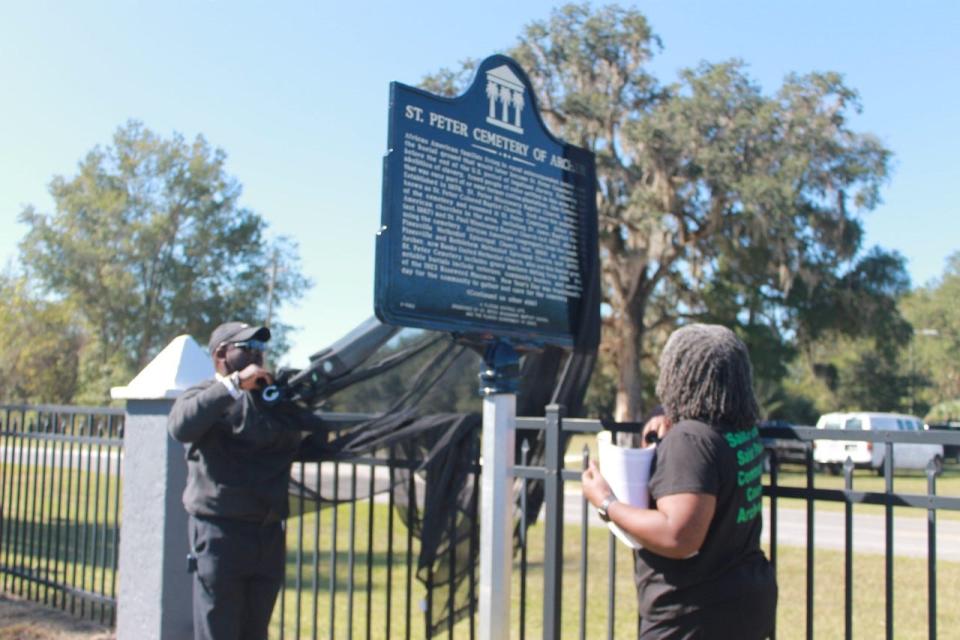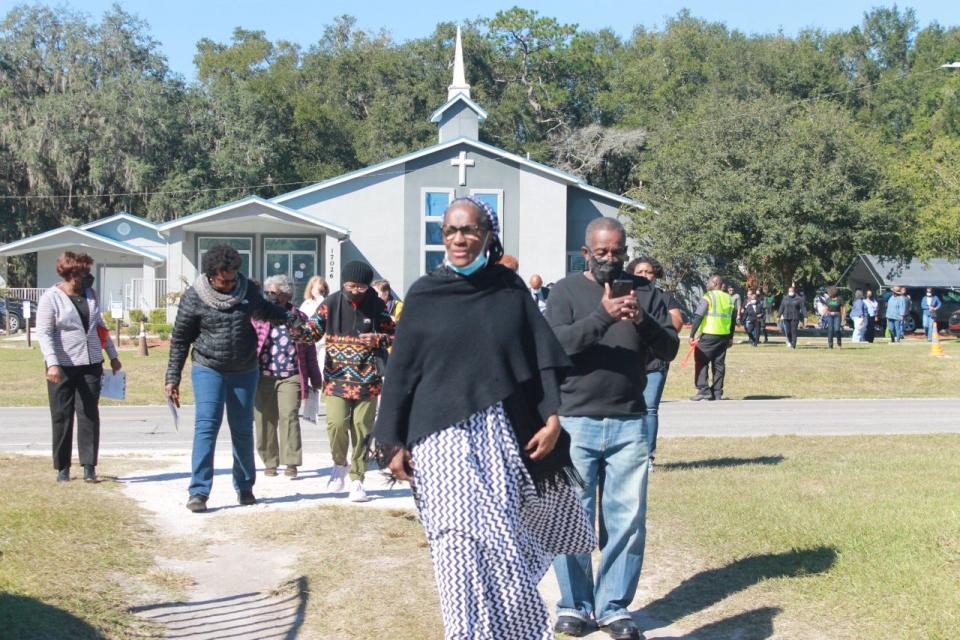Archer community unveils state historical marker at historic Black cemetery
- Oops!Something went wrong.Please try again later.
Archer residents and others celebrated a treasure in the rural southwest Alachua County town as they turned out for the dedication ceremony for the unveiling of the St. Peter Cemetery Historical Marker.
About 100 people attended the ceremony held Saturday on the grounds of St. Peter Baptist Church at 17026 SW 83rd Ave. in Archer.
“This is the last footprint our ancestors left behind — it is where they’re buried,” said Gerie Crawford, chair of the St. Peter St. Paul Community Council (SPSPCC), the group that organized and hosted the event along with St. Peter Baptist Church, St. Paul Baptist Church, Banks United Methodist Church and the St. Peter Cemetery Committee. “I am excited to have the community come and celebrate with us and to bring families together to talk to each other about what’s going on and how to continue our legacy for generations.”
The historical marker was designated by the Florida Historical Marker Council, and it details the history of the Pinesville and St. Peter neighborhoods established in the 1800s in Archer.
Marker details history of cemetery, churches and community
According to the marker, Black families have used the burial ground that would later become St. Peter Cemetery since before the end of slavery. Established in 1878, St. Peter Baptist Church, originally known as St. Peter Colored Baptist Church, took over the maintenance of the cemetery and renamed it St. Peter Cemetery.
Other Black churches in the area, including St. James Baptist Church, established in 1867, and St. Paul Baptist Church, established in 1913, also began using the cemetery. Black congregants from the combined Pinesville Methodist Episcopal Church, established in 1869, in neighboring Pinesville and Bethlehem Methodist Episcopal Church, established in 1870, now called Banks United Methodist Church, also use the cemetery that has grave markers dating to 1886.
Some notable burials include veterans, community leaders and survivors of the 1923 Rosewood massacre. Another interesting note about the cemetery is that New Year's Day was traditionally a day the community gathered and tidied up the cemetery.
Generations of Blacks, like the Nattiel, Rollins, Brown, Crawford, Moss, Spann, Neil, Michael, Miles and Hunt families have lived in this area, with many still owning their original property.
"St. Peter Cemetery represents honor, dignity, and respect for deceased loved ones that was not always given in life to African Americans," a section of the marker reads.
It's important to honor and celebrate the past
“The history of Alachua County can’t be told without the stories of the enslaved Africans,” said Dr. Michelle Rutledge, a member of SPSPCC. “We’re here to celebrate the historical marker and commemorate over 150 years in the making. We honor our ancestors and recognize the contributions they made in the state, nationally and internationally. We come to celebrate the resilience of our people.”

Melanie Barr spoke on behalf of the Alachua County Historical Commission, Alachua County Commissioner Charles Chestnut IV talked about Alachua County’s Truth and Reconciliation process and the county’s Community Remembrance Project that was spearheaded by Evelyn Foxx, president of the NAACP Alachua County chapter, Jackie Davis, Nkwanda Jah and Meg Niederhofer.

“It is important that our history is told,” Chestnut said. “We can’t have reconciliation without the truth. History is the truth. We have to tell the truth so we won’t repeat it.”
Alachua County Commissioner Marihelen Wheeler also spoke.
“It is an occasion of deep pride in the Alachua County and Pinesville community,” Wheeler said. “Known for its historic grave sites, farmland and churches, we congratulate the volunteers for their dedication and passion. Your labor of love will be felt for generations to come.”
Alisha Hunt, a former master sergeant in the U.S. Army, honored veterans during her speech that was followed by words from community elders Audrey Crawford and Roneda Moss who both talked about two dear friends of theirs and the community's — Beatrice Neal and Lillie Hunt.
“The two ladies were very dedicated to the community,” Moss said. “When someone passed away, they would assist the families with what they needed.”
Satori Days introduced the special invited guests that included former collegiate and professional football players Ricky Nattiel and Michael Nattiel Jr., professional baseball player Derek Robinson, and Olympic gold medalist track star Jearl Miles-Clark, all of whom were born and raised in the community.
The unveiling of the historical marker was led by SPSPCC officer Connie Lee and the closing prayer was delivered by Pastor Samuel Neal III of St. Paul Baptist Church.
The ceremony ended with people visiting the headstones of deceased loved ones to pay their respects.
SPSPCC was founded in 2020 after residents in Archer were concerned about a possible solar farm being built near the historic Black neighborhoods of Pinesville and St. Peter.
The solar farm proposal was a rude awakening for residents in the neighborhoods near the cemetery and led them to organize to preserve the history of the area, Crawford said.
“We were under duress when we heard a solar facility being proposed in a historic African-American neighborhood,” Crawford said. “We mobilized to protect and preserve our neighborhoods.”
SPSPCC teamed up with Nigel Rudolph of the Florida Public Archaeology Network.
FPAN is an organization dedicated to the protection of cultural resources — both on land and underwater — to involve the public in the study of their past.
“I participated in the project by publicly recognizing the value of the cemetery,” Rudolph said. “This has been the greatest accomplishment in my archaeology career. Cemeteries provide a valuable history of the past. The living community is a vehicle that connects headstones to the present.”
This article originally appeared on The Gainesville Sun: Archer community unveils historical marker at historic Black cemetery

